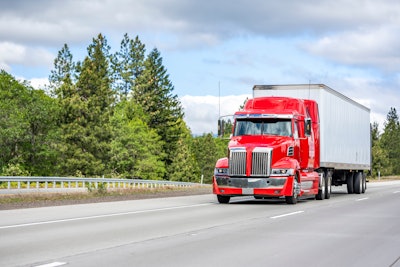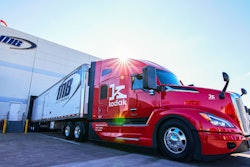
The Environmental Protection Agency today announced a final rule the agency said sets stronger standards to reduce greenhouse gas emissions from heavy-duty vehicles beginning in model year 2027. Major trucking organizations reacted, saying the industry has already done plenty to reduce pollution, and the new rules will be expensive, and overly burdensome, especially for small trucking businesses.
The EPA said the new standards set in “Greenhouse Gas Emissions Standards for Heavy-Duty Vehicles – Phase 3,” will apply to heavy-duty vocational vehicles including delivery trucks, refuse haulers, public utility trucks, transit, shuttle, school buses, and tractors such as day cabs and sleeper cabs on tractor-trailer trucks.
The agency said the new standards are technology-neutral and performance-based, allowing each manufacturer to choose what set of emissions control technologies is best suited for them and the needs of their customers. They take effect in 60 days.
The trucking industry's leading advocacy organizations object to the new standards. Here's what they said:
Truckload Carriers Association President Jim Ward
"It’s important to recognize the progress that’s been made by our many TCA members who have tested equipment, trained both technicians and professional drivers, while incurring additional costs along the way to complying with EPA regulations instituted over the past couple of decades. The industry has effectively reduced NOx and Particulate Matters through the evolution and implementation of new technologies and remains committed to being a good steward of the environment. The journey ahead provides for many alternatives to be considered to lower carbon such as blended biodiesel, renewable natural gas, diesel-electric, just to name a few to help us bridge the gap to the future. We cannot just sit idly by and watch the implementation of a policy that will have a significant impact on our members' business.”
Clean Freight Coalition Executive Director Jim Mullen
“The members of the Clean Freight Coalition have a long history of collaborating with federal regulators on sound regulations that support environmental improvements at the right speed. However, our members oppose the Environmental Protection Agency’s final Greenhouse Gas Emissions Regulations for Heavy-Duty Vehicles-Phase 3 rule – a regulation that will require the adoption of zero-emissions commercial vehicles at a pace that isn’t possible due to the limits of today’s technology. Today, these vehicles fail to meet the operational demands of many motor carrier applications, reduce the payload of trucks and thereby require more trucks to haul the same amount of freight, and lack sufficient charging and alternative fueling infrastructure to support adoption. In addition, battery electric motorcoaches have a reduced range and capacity compared to diesel buses. These commercial vehicles are in their infancy and are just now being tested and validated with real world-miles.
Owner-Operator Independent Drivers Association President Todd Spencer
“Small business truckers, who happen to care about clean air for themselves and their kids as much as anyone, make up 96% of trucking. Yet this administration seems dead set on regulating every local mom and pop business out of existence with its flurry of unworkable environmental mandates. This administration appears more focused on placating extreme environmental activists who have never been inside a truck than the small business truckers who ensure that Americans have food in their grocery stores and clothes on their backs. If you bought it, a trucker brought it.”
American Trucking Associations President and CEO Chris Spear
"ATA opposes this rule in its current form because the post-2030 targets remain entirely unachievable given the current state of zero-emission technology, the lack of charging infrastructure, and restrictions on the power grid. Given the wide range of operations required of our industry to keep the economy running, a successful emission regulation must be technology-neutral and cannot be one-size-fits-all. Any regulation that fails to account for the operational realities of trucking will set the industry and America's supply chain up for failure."
American Truck Dealers Association President Laura Perrotta
“American Truck Dealers (ATD) is opposed to EPA’s final Phase 3 GHG rule because it will have unprecedented negative impacts on American commercial trucking, large swaths of U.S. businesses, customers and consumers, and likely overall emissions and the environment. Less than 1% of commercial vehicle sales today are ZEVs, yet this rule sets overly aggressive electric truck targets on a short timeline that will not result in increased zero-emission truck sales and lowered GHG emissions but will have lasting negative consequences. The technology-forcing regulations and barriers to new-truck sales are enormous and are resulting in only one outcome: new trucks that commercial customers simply can’t afford, cannot reliably charge or utilize, and therefore won’t purchase. The Phase 3 rule will only exacerbate this problem by further forcing commercial vehicle customers to hold on to existing fleets or purchase used trucks. Having older trucks remain on the road does nothing to save fuel, make our roads safer or reduce GHG emissions.
NATSO and SIGMA, which represent truck stops and fuel marketers
"We appreciate that the Biden Administration is working toward a more pragmatic approach to reducing carbon emissions from heavy-duty vehicles. Our industry shares this objective, and today's rule, coupled with the National Zero Emission Corridor Strategy, demonstrates that the administration recognizes at least some of the impediments to private sector investment in heavy-duty electric vehicle charging. Unfortunately, today's final rule represents only a modest improvement from the proposed rule. The administration's final rule does not adequately consider the challenges that fuel retailers face in transitioning to heavy-duty truck electrification. The administration's final rule also does not recognize the need to support lower carbon alternatives to diesel fuel that are currently commercially viable, such as biodiesel and renewable diesel."










